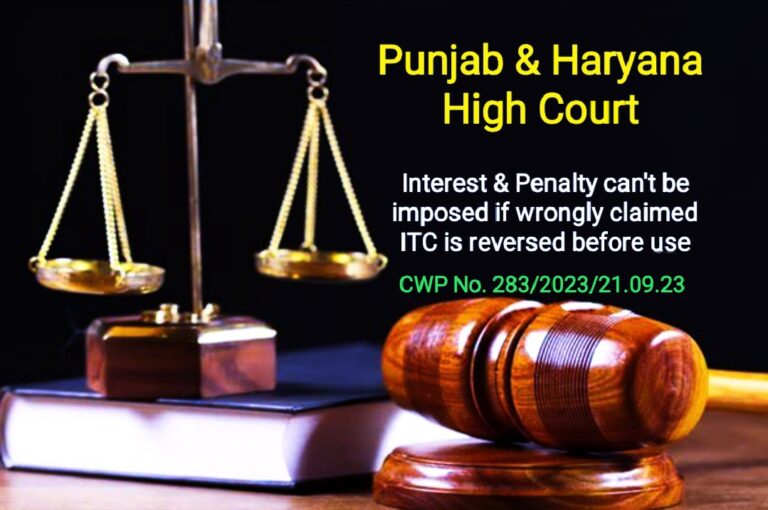Interest & Penalty cannot be Imposed if Wrongly Claimed Input Tax Credit (ITC) is Reversed Before Use – Punjab & Haryana High Court Order for Deepak Sales Corporation
Legality of Imposing Penalty & Interest When Wrongly Availed ITC is Reversed Before Use: In a recent landmark judgement, the Punjab and Haryana High Court, through the case of M/s. Deepak Sales Corporation v. Union of India [CWP No. 283 of 2023 dated September 21, 2023], has provided relief to taxpayers by ruling that interest and penalty cannot be imposed if inaccurately claimed Input Tax Credit (ITC) is promptly reversed and remains unused.
Key Facts of the Case:
M/s. Deepak Sales Corporation, a trading firm registered under the Haryana VAT Act, 2003, mistakenly entered an ITC amount of Rs.14,05,78,663/- instead of Rs.1,40,57,836/- during the transition to the Goods and Services Tax (GST) regime. This resulted in an excess ITC claim of Rs.12,65,20,827/-. Despite the petitioner’s attempts to rectify the error and seek guidance from the Revenue Department, no response was received.
Upon receiving a Show Cause Notice on 27 October 2020, demanding interest and penalty, the petitioner rectified the error and reversed the excess ITC. However, the Revenue Department, in an Order dated March 31, 2021, imposed interest and penalties, a decision contested by the petitioner.
High Court Decision:
The main issue addressed by the Punjab and Haryana High Court was whether penalties and interest could be imposed when wrongly availed credit is not utilized by the taxpayer.
The court referred to Section 50(3) of the CGST Act, which mandates the payment of interest on unjustifiable or excessive ITC claims, capped at twenty-four percent.
Citing precedent cases, including Commissioner of Central Excise v. Jagatjit Industries Ltd. and CCE Rohtak v. Grasim Bhiwani Textile Ltd., the court emphasized that if the erroneously claimed credit is reversed before utilization, the demand for interest and penalties becomes unjustifiable.
The court highlighted the legislative intent that penal actions should only be initiated when the wrongly claimed ITC is utilized. Therefore, the court ruled that no interest or penalty could be upheld if the excess ITC was promptly reversed and remained unused by the taxpayer.
Conclusion:
In a significant win for taxpayers, the Punjab and Haryana High Court overturned the disputed Order, stating that M/s. Deepak Sales Corporation is not liable to pay interest or penalty on the mistakenly claimed ITC. This decision provides clarity on the application of interest and penalties in cases where erroneous ITC claims are rectified before utilization, offering relief to businesses navigating the complexities of the GST regime.
To Access the Recent GST Advisory 615 on Direct API Integration with IRPs CLICK HERE
Read More
Corrigendum to Notification 4/2021: Changes in SFT Reporting of Mutual Fund Transactions

DreamProxies.com – 100 your best private proxies by means of major deals + Extremely speedily proxy serrvers!